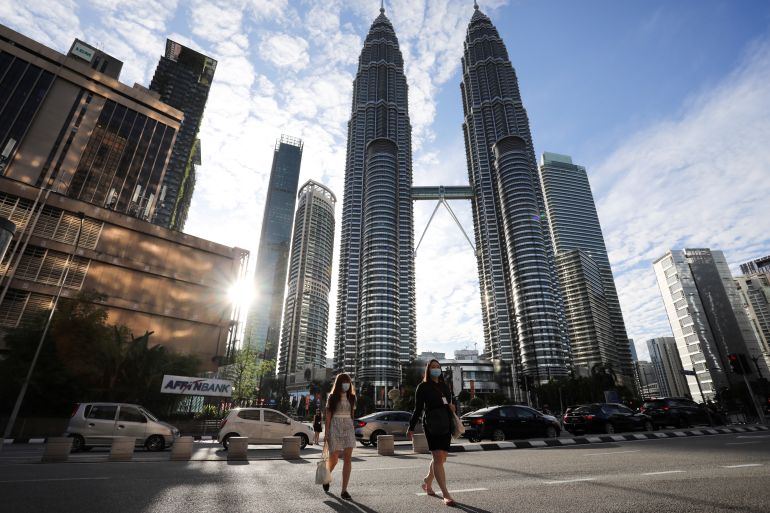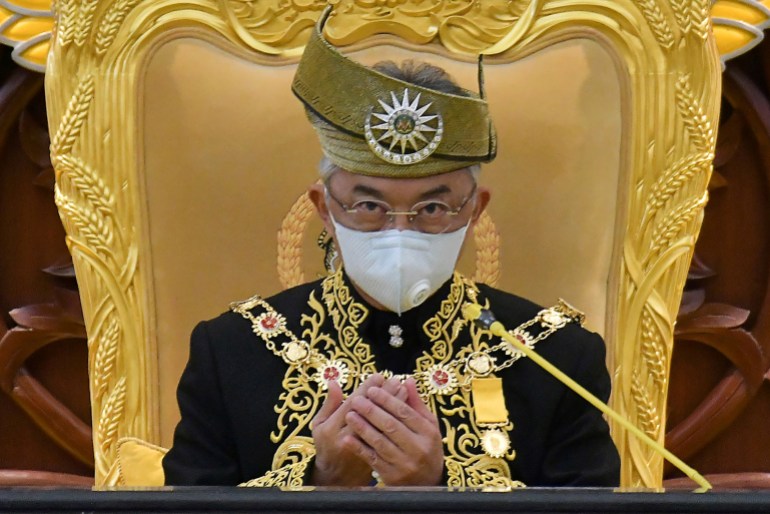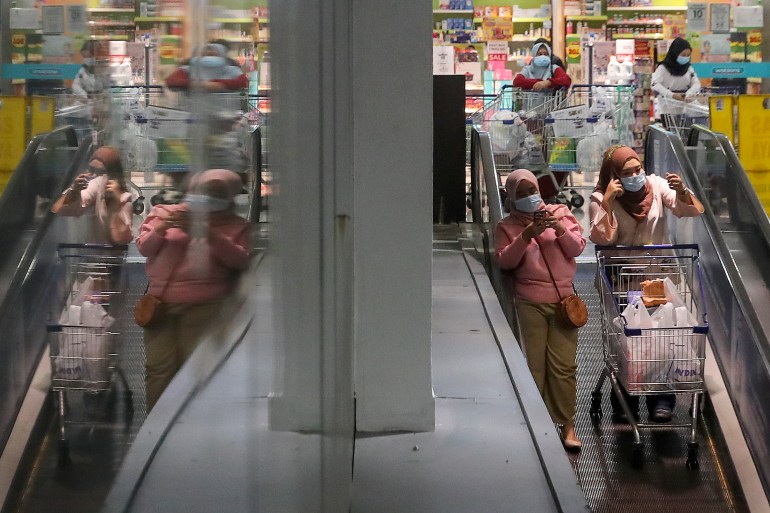At COVID-19 ‘breaking point’, Malaysia suspends parliament
State legislatures will also be suspended with parts of country heading back into lockdown amid surge in COVID cases.

Malaysia announced a state of emergency on Tuesday morning, suspending parliament and state legislatures, hours before millions of Malaysians were set to go back into lockdown following a surge in coronavirus cases that threatened to overwhelm the country’s public health system.
A statement from the royal palace said the king had agreed to a declaration of emergency following a Monday meeting with Prime Minister Muhyiddin Yassin in view of the escalating pandemic and its pressure on the public health system. The emergency will remain in force until August 1, or earlier if COVID-19 cases fall, the statement said.
Keep reading
list of 4 itemsMalaysia steps up COVID vaccine plans with AstraZeneca deal
Lone children among hundreds in Malaysia immigration detention
Malaysia’s king rejects PM’s push for COVID emergency rule
In a televised speech on Tuesday morning, Muhiyddin said that under the emergency the national parliament and state legislatures would be suspended and elections would no longer be allowed. There would be no curfew and his government would continue to run the country, he said.
“A lot of people are, number one, in disbelief,” political analyst Oh Ei Sun told Al Jazeera. “They are looking to learning more details about how their civil rights might be curtailed.”
On Monday evening, without mentioning the king had already approved his request for an emergency, Muhyiddin announced a lockdown from midnight (13:00 GMT) in eight states and federal territories of the country because hospitals were at “breaking point”. The lockdown includes Kuala Lumpur and the states of Sabah, Selangor, Penang and Johor where the lockdown will remain in force for two weeks until January 26.
Malaysia brought an earlier wave of COVID-19 under control with a strict three-month lockdown under which people were mostly prevented from leaving their homes and gradually eased curbs as cases dwindled. In July last year, authorities announced zero new cases of local transmission.
But the situation began to change in September after an election in the Borneo state of Sabah at a time when cases had already started to increase.

The election took place with coronavirus protocols in force but a large number of campaign events and frequent travel between Sabah and the peninsular – with no quarantine in place- helped seed outbreaks elsewhere.
Political pressures
Muhyiddin formed a government in early March after a power grab led to the resignation of then-Prime Minister Mahathir Mohamad and has been under pressure ever since to prove his support in parliament.
In recent weeks, he has faced criticism of his administration’s handling of the pandemic and there have been renewed rumblings within the United Malays National Organisation (UMNO), the biggest party in his ruling alliance, about elections. Muhyiddin is currently thought to have the support of about 110 members of the 222 seat house.
“The declaration of a state of emergency seems like another attempt by Muhyiddin to hold on to power, block elections and remove parliamentary oversight, rather than to seriously address the pandemic,” said Josef Benedict, a researcher with rights group CIVICUS Monitor. “A dark day for democracy”.
The statement from the palace indicated an “independent committee” would be formed in relation to the country’s COVID-19 response.
ASEAN Parliamentarians for Human Rights (APHR), a group of Southeast Asian lawmakers, expressed “alarm” at the decision to impose emergency rule.
“Parliaments play an essential role as guardians of democracy and human rights, particularly during times of crisis,” APHR Board Member Tom Villarin said in a statement. “Important measures are currently being adopted in Malaysia and parliament provides much needed scrutiny, which is particularly important when the current government came to power through back-door manoeuvring and not at the ballot box.”
Muhyiddin said his government would use the emergency decree to propose an increase in military and police power in relation to public health and to tighten controls over its borders.
Law enforcement has already played a prominent role in the pandemic manning road blocks and enforcing strict lockdowns in virus hotspots, with the government announcing every day the numbers of people picked up for breaching coronavirus measures. The country’s borders have been closed to non-Malaysians since March.
“Emergency or not, the question remains, what will gov do differently to curb Covid-19?” opposition politician and former minister Yeo Bee Yin wrote on Twitter. “It isn’t about how much power you have, it’s what you do with it.”
Under an Emergency Proclamation, Parliament is suspended. An Emergency is powerful. It means there is no public accountability to Parliament. Instead, power is concentrated in the hands of the Prime Minister. And an independent committee (that we need more info on).
— Tricia Yeoh (@TriciaYeoh) January 12, 2021
A declaration of emergency is a declaration of failure really. Failure to manage the pandemic, failure to govern, failure to care about the people.
— Marina Mahathir (@netraKL) January 12, 2021
In simple terms, what happened in Malaysia today is akin to Trump going to Capitol himself and cancelling everything related to 2020 polls and saying need to focus on Covid-19 which he allowed to slide.
Gittew.— Jahabar Sadiq (@jsadiq) January 12, 2021
The prime minister previously requested an emergency in October when opposition leader Anwar Ibrahim insisted he had the numbers to form a government and COVID-19 cases were beginning to rise. Instead, limited movement restrictions were imposed but relaxed even as the caseload increased. Over the end of the year holidays, inter-state travel was again allowed and many Malaysians took holidays or went to visit friends and family.
Daily cases have been mostly above 2,000 since the start of the year and breached 3,000 last week. Malaysia now has more active cases of the coronavirus than the Philippines, and some 187 people are in intensive care with 87 people needing ventilation. The 15 government hospitals designated to treat COVID-19 patients have already filled 70 percent of available beds, with some intensive care units already full.
‘Kneejerk reaction’
Opposition politician Liew Chin Tong earlier described the new lockdown as a “kneejerk reaction” calling instead for the government to get private health providers involved in tackling the pandemic, expand testing, enhance contact tracing and improve data transparency.
“There is no livelihood nor economic recovery if we can’t deal with COVID-19 decisively,” Liew said in a statement. “The lives versus livelihood dichotomy is false.”

Under the new lockdown social gatherings will be banned, while restaurants and cafes will only be allowed to offer takeaway meals. People in lockdown areas will not be able to travel more than 10 kilometres (6.21 miles) from their home.
Five “essential” sectors of the economy, including manufacturing and construction, will be able to continue operations under strict conditions. The prime minister did not announce any new initiatives to support people and businesses affected by the lockdown.
Shortly after the announcement, the health ministry revealed that the country had identified its first case of the highly-transmissible UK variant B.1.1.7.
The 22-year-old Malaysian man had arrived back from Britain last month and was diagnosed with the variant on December 28, Noor Hisham Abdullah, the director general of the Ministry of Health wrote on his Facebook page. Malaysia’s borders have been closed to non-Malaysians for nearly a year and any citizens who return are required to complete two weeks in hotel quarantine at their own expense.
Malaysia is due to receive its first shipment of vaccines – from Pfizer-BioNTech – next month and plans to vaccinate about 70 percent of the population.
Earlier on Monday it announced a deal to buy an additional 12.2 million doses of the Pfizer vaccine to add to an initial order of 12.8 million doses. The country is also buying AstraZeneca’s vaccine, which is cheaper and easier to handle and is in negotiations for vaccines produced by Russia and China. It is also part of the World Health Organization’s COVAX vaccine initiative.
As of Monday, Malaysia had reported a total of 138,224 cases of coronavirus and 555 deaths. Three Cabinet ministers have also been confirmed to have COVID-19 this week.